关键词 > COMP9120
COMP9120 Database Management Systems Assignment 2
发布时间:2024-05-09
Hello, dear friend, you can consult us at any time if you have any questions, add WeChat: daixieit
COMP9120 Database Management Systems
Assignment 2: Database Application Development
Group Assignment (15%)
Introduction
The objectives of this assignment are to gain practical experience in interacting with a relational database management system using an Application Programming Interface (API) (Python DB-API). This assignment additionally provides an opportunity to use more advanced features of a database such as functions.
This is a group assignment for teams of 3 members. It is assumed that you will continue in your Assignment 1 group. You should inform the unit coordinator as soon as possible if you wish to change groups.
Please also keep an eye on your email and any announcements that maybe made on Ed.
Submission Details
The final submission of your database application is due at 11:59pm on Sunday 12th May (Week 11). You should submit the items for submission (detailed below) via Canvas.
Items for submission
Please submit your solution to Assignment 2 in the ’Assignment’ section of the unit’s Canvas site by the deadline, including EXACTLY THREE files:
• An assignment coversheet as a PDF document (.pdf file suffix) which is available for download fromthis linkon Canvas.
• A SQL file (FFKSchema.sql) containing the SQL statements necessary to generate the database schema and sample data. This must contain the original schema and insert SQL statements, and any stored procedures (functions) you may have added.
• A Python file (database.py) containing the Python code you have written to access the database.
Task 1: The Fine Food Kitchen (FFK) System
In this assignment, you will be working with the FFK system for staff use that you will be developing. The system requires work in numerous areas, including interaction with the database. Your main task in this assignment is to handle requests for reads and writes to the database using your user interface (UI). We first describe the main features that the FFK system should include from a UI perspective, and then discuss where the majority of your database code needs to be implemented.
Logging In
The first formauser is presented with, when starting the FFK system is the Login, as shown in Figure 1. This feature requires that a staff enters their username and password to be validated prior to being successfully logged in to the system. Security features such as password encryption/hashing is out of scope for this assignment. Once logged in, the user is taken to the menu items list page to view their associated menu items.
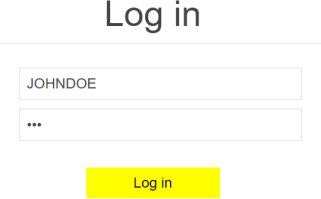
Figure 1 – Login form
Viewing Menu Items List
Once a user is logged in, they are shown a list of all their associated menu items, as shown below in Figure 2. This list must be ordered such that the most recently reviewed menu items appear at the bottom. The list is also sorted by description in ascending order, and price in descending order. Each menu item has a name, description, category, coffee option (coffee type, milk kind), price, review date, and reviewer. A menu item is associated with a staff if the staff is assigned as the person in charge of reviewing the menu item.
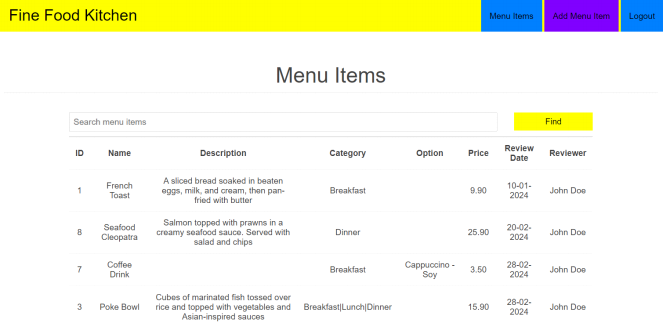
Figure 2 – Viewing Menu Items List
Finding Menu Items
A user can search through all menu items by entering a word or phrase (a ‘keyword’) in the field next to the Find button, as shown in Figure 3, and then clicking on Find. When such a keyword is specified, then the retrieved menu items and shown on the list are those that include this word or phrase in the name, description, category, coffee option (coffee type or milk kind), or reviewer’s full name. The search is case insensitive. For example, given the search keyword ‘fee’, Find will return all menu items that include the keyword ‘fee’ in the name, description, category, coffee option (coffee type or milk kind), or reviewer’s full name. Searching with a blank/empty keyword field will show all of the logged in user’sassociated menu items. Any search results returned must be ordered such that menu items without a reviewer would appear at the top, and then by review date in descending order. The search results must exclude those menu items whose review dates are older than 10 years (from today’s date).
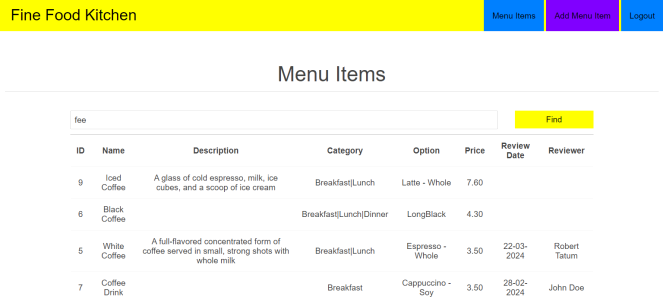
Figure 3 – Finding Menu Items
Adding a Menu Item
Users may also add a new menu item by clicking on the Add Menu Item tab in the title bar. They may enter menu item details such as name, description, categories, coffee type (for coffee item), milk kind (for coffee item), and price, in the popup dialog. Once the popup dialog appears, click on Add Menu Item button, as shown in Figure 4. A new menu item will not be assigned a review date nor reviewer. A coffee type must be provided when a milk kind is specified.
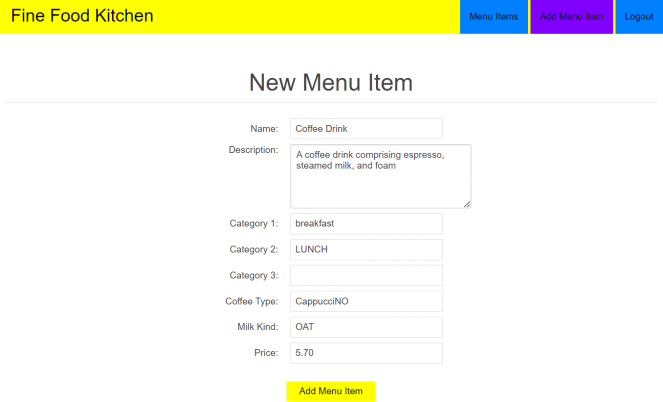
Figure 4 – Adding a Menu Item
Updating a Menu Item
Users can also update a menu item by modifying data in the menu item details screen as shown in Figure 5, and clicking on Update Menu Item button. You can access this update screen by clicking on a menu item from the list of menu items in the Menu Items tab.
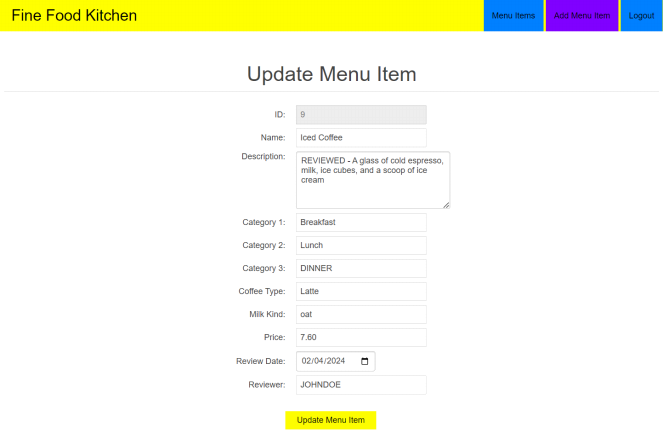
Figure 5 – Updating a Menu Item
Database Interaction Code
The files that are needed for the Python version of assignment areas follows:
1. FFKSchema.sql: a file which contains SQL statements you need to run to create and initialise
the FFK system database, before starting the application
https://canvas.sydney.edu.au/files/36452494/download?download_frd=1
2. Assignment2_PythonSkeleton.zip: a zip file encapsulating the Python project for the FFK systemhttps://canvas.sydney.edu.au/files/36393167/download?download_frd=1
To inspect the FFK system code, you need to unzip the ZIP archive first, which will create a folder that includes the name Assignment2_PythonSkeleton. If you experience any difficulties installing and exploring the project, ask your tutor or lecturer for assistance.
The skeleton code uses a number of Python modules to implement a simple browser-based GUI for the FFK system. The main modules are the Flask framework for the GUI and the psycopg2 module for the PostgreSQL database access. Similar to tutorial 6, you will need to install the Psycopg2 module and the Flask module. The skeleton code follows the structure described below:
• The main program starts in the main.py file. You need to use the correct username/password details as specified in tutorial 6, and then implement the missing database access functions – including any necessary SQL code statements required – in the data layer database.py.
• The presentation layer is done via a simple HTML interface that can be accessed from a web browser. The corresponding page templates are located in the templates/ subdirectory, their CSS style file is static/css.
• The transition between the different GUI pages and the initialisation of the Flask framework is done in the routes.py file. It currently just invokes the pages, but there is no further business logic implemented yet.
You can run the code by running “python main.py”. This starts a local web server and prints out some debug messages in the terminal; the GUI can then be accessed with any web browser on the same computer via the local URL http://127.0.0.1:5000/ (If that doesn’t work you can also try http://0.0.0.0:5000/). Please note that, to terminate the application, you will need to stop the local web server which is running in the background.
Task 2: Functions Implementation
Core Functionality
In this assignment, you are provided with a Python skeleton project that must serve as the starting point for your assignment. Your task is to provide a complete implementation for the file database.py, as well as make any modifications necessary to the database schema (i.e., FFKSchema.sql). Specifically, you need to modify and complete these five functions:
1. checkStaffLogin (for login)
2. findMenuItemsByStaff (for viewing menu items list)
3. findMenuItemsByCriteria (for finding menu items)
4. addMenuItem (for adding menu item)
5. updateMenuItem (for updating menu item)
Note that, for each function, the corresponding action and outcome should be implemented by issuing SQL queries to the database management system. If you directly output the result set, pre-process, manipulate and/or make changes to the input or output datasets using Python code or additional modules (libraries) i.e. without issuing SQL queries, you are considered as cheating, and you will get penalised heavily and most likely get zero point for the assignment. No additional Python modules or libraries should be imported.
Marking
This assignment is worth 15% of your final grade for the unit of study. Your group’s submission will be marked inline with the rubric that follows.
Group member participation
If members of your group do not contribute sufficiently, you should alert the unit coordinator as soon as possible. The course instructor has the discretion to scale the group’s mark for each member as follows:
|
Percentage of contribution |
Proportion of final grade received |
|
< 5% contribution |
0% |
|
5 - 10% contribution |
20% |
|
11 - 15% contribution |
40% |
|
16 - 20% contribution |
50% |
|
21 - 24% contribution |
60% |
|
25 - 28% contribution |
80% |
|
29 - 30% contribution |
90% |
|
> 30% contribution |
100% |
Note: The above table assumes that each group will have 3 members, so, on average, around 33% contribution is expected from each member of the group. In special case, if the group has less than 3 members then the contribution percentage will be adjusted accordingly. You must justify your contribution percentage by providing detailed explanation of your contribution on the coversheet mentioned before. You should also maintain a diary of your group meetings and discussions on Canvas. Furthermore, we will run random face- to-face interviews to understand your contribution, if needed.
Marking Rubric
Your submissions will be marked according to the following rubric, with a maximum possible score of 15 points.
|
|
Part Marks (0 - 1.5 pts) |
Full Marks (2 - 2.5 pts) |
|
Login |
Can correctly login the user ‘JOHNDOE’ and validate his username and password. |
All valid users can be logged in successfully, and unsuccessful userlogins should be rejected. |
|
View Menu Items List |
Correctly list all menu items associated with user ‘johndoe’ in the correct order (see Figure 2). |
Correctly list all menu items associated with a user, in the correct order, for all possible username input from Figure 1. |
|
Find Menu Item |
Correctly list menu items for keyword “fee” (see Figure 3). |
Correctly list menu items for all possible keywords. |
|
Add Menu Item |
Can correctly add a menu item to the database. |
Can correctly add all valid menu items to the database. Menu items entered with invalid details should be rejected. |
|
Update Menu Item |
Can correctly update the status of a menu item. |
Can correctly update details of all menu items, ensuring the updated details for a menu item are valid. |
|
Stored Procedure (Function) |
A couple of stored procedures (functions) are correctly created in the submitted SQL file. |
A couple of stored procedures (functions) are correctly created in the submitted SQL file, and correctly called in two of the five specified functions. |
|
|
No Marks (0 pt) |
Full Marks (1 pt) |
|
|
Record |
Keeping |
One or more issues reported or found |
No issue reported or found with group member |
|
of |
Group |
with group member participation and |
participation. All group members participate |
|
Discussions |
maintaining records of group meetings and discussions on Canvas. |
and regularly maintain a diary of group meetings and discussions on Canvas. |
|

